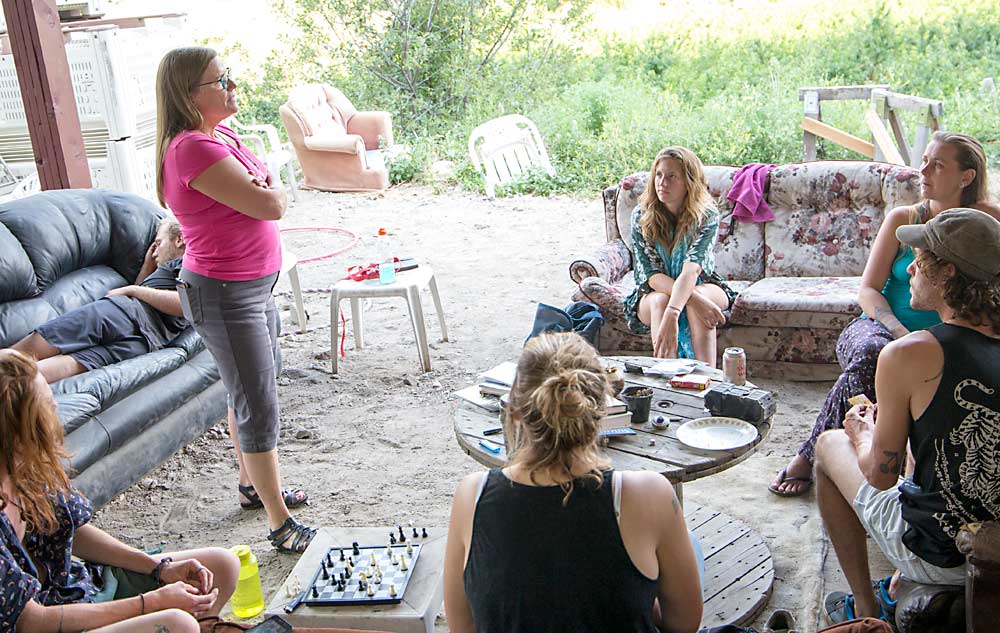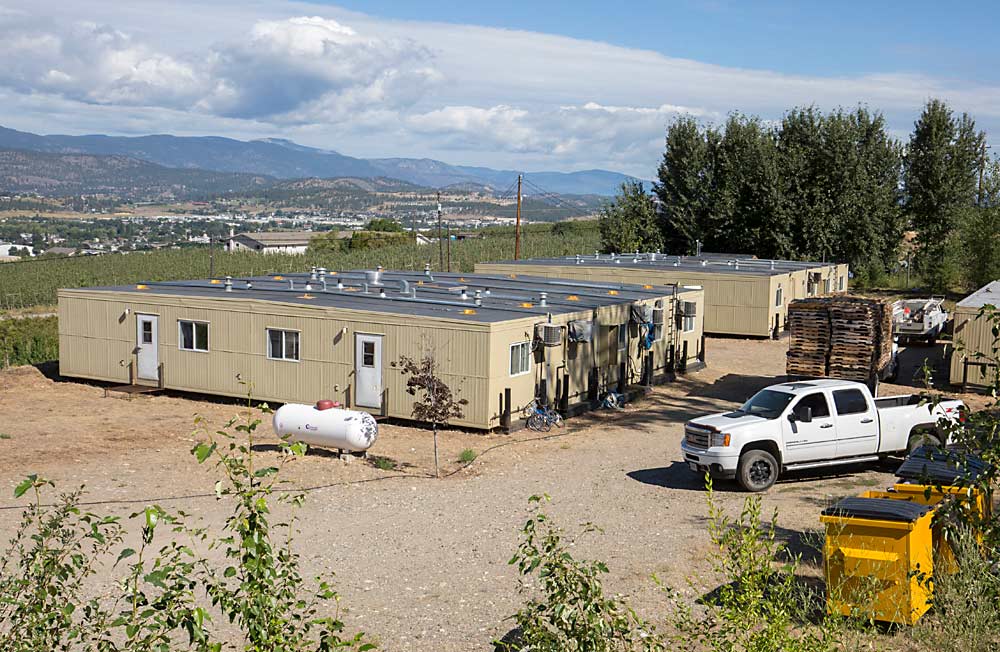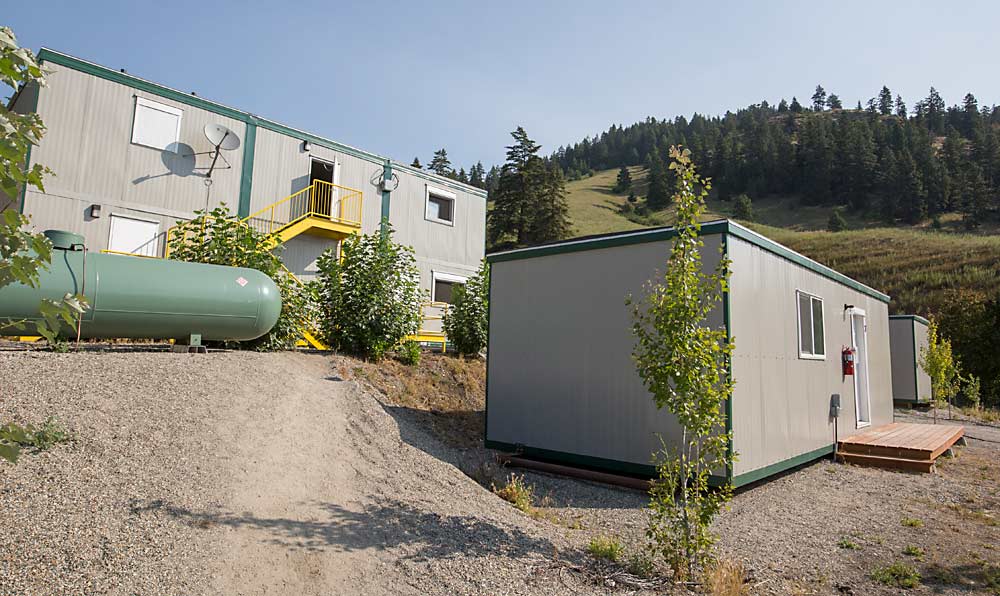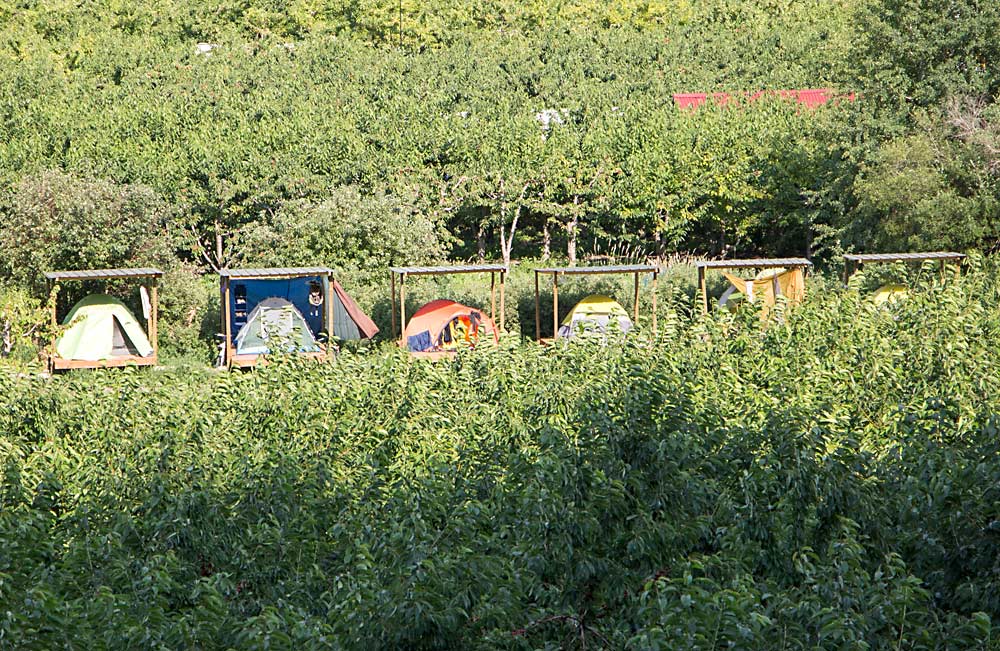
Tents and mobile housing give Coral Beach Farms’ seasonal employees sweeping views of the cherry blocks and surrounding hills of Coldstream, British Columbia. Flanked by outdoor recreation and picturesque views, the tree fruit industry of British Columbia is a hot spot for employees who are backpacking through the region and are allowed to camp on the farms. Foreign laborers hired through federal government work programs must have separate and more structured resident units. (TJ Mullinax/Good Fruit Grower)
Just back from swimming in nearby Okanagan Lake, seasonal cherry pickers while away the afternoon smoking, playing chess and reading on dusty couches under an awning at the Carcajou Fruit Co. near Summerland, British Columbia.
Hailing from Canada, Germany, England and Australia, they bunk in tents between orchard blocks, saving money for ski season or their next vagabond adventure.
“It’s kind of like just an easy lifestyle once you get good at picking,” said Amanda MacKenzie of Halifax, Nova Scotia. Her next stop, she hoped, was somewhere in Africa.
The mountain lakes and forested hills of the Okanagan Valley tree fruit growing region don’t just attract tourists; they bring traveling farm laborers, usually called backpackers. Canada is one of several nations with laws that allow “working holiday” employees to simply camp on the farms where they work.

Jan Carlson, standing, discusses contingency evacuation plans in July 2018 with backpacking workers, including Amanda MacKenzie, center on couch, as wildfires burn in the hills surrounding the Carcajou Fruit Co. near Summerland, British Columbia. (Ross Courtney/Good Fruit Grower)
However, just as in many fruit producing areas, Canadian growers face labor shortages and are increasingly turning to government-sanctioned guest worker programs with established connections to Mexico and several Caribbean countries. There are no tents for these employees; federal law requires growers to provide structural housing to employees hired through the government’s Seasonal Agricultural Worker Program, or SAWP.
The difference leaves one of the hills overlooking the cherry blocks of Coral Beach Farms in Coldstream, British Columbia, dotted by both tents and mobile homes surrounding one common building. The downstairs has a kitchen and showers for the SAWP workers, while the backpackers use the upstairs.
Combined, Coral Beach has capacity for 90 seasonal workers at the Coldstream location, said Gayle Krahn, orchard manager. The juxtaposition doesn’t seem to bother anybody. The backpackers have not tried to ask for housing beyond the tent sites, Krahn said, though they wish the farm’s shade trees would grow a little faster.

Backpackers may camp in tents, but foreign guest workers contracted through the federal government’s Seasonal Agricultural Worker Program, or SAWP, must have structural residences. Hillcrest Farms of Kelowna, British Columbia, repurposed trailers from oil fields as housing for SAWP workers. Adding even more complexity, in British Columbia, even SAWP units must be mobile due to agricultural land-use laws, so most growers use mobile homes or trailers. (TJ Mullinax/Good Fruit Grower)
“It’s almost like a lifestyle for our backpackers,” Krahn said. “They almost enjoy the camping and the camaraderie they have camping together.”
And they pay for the right at some farms. Coral Beach, one of British Columbia’s larger fruit companies, charges $200 per month for a campsite, which comes with the use of showers, kitchen and laundry amenities. Farm managers found workers committed to longer work periods after they started charging rent.
New Zealand, Australia and Europe also have a backpacking orchard worker culture and many orchardists rely on those travelers, typically those 18 to 30 years old, to meet seasonal labor needs.

SAWP units at Coral Beach Farms in Coldstream, British Columbia, include a large communal kitchen and bath facility, at left, and several smaller buildings where workers sleep. (TJ Mullinax/Good Fruit Grower)
In 2017, the Australian government imposed a 15 percent tax on the first $37,000 earned by “working holiday makers,” according to the country’s taxation office website. The original proposal featured a 32.5 percent tax rate, but officials lowered it after backlash from farm groups against what became nicknamed the “backpacker tax.”
Australia also has reciprocal agreements with New Zealand and several European countries to charge working holiday employees levies for state-run medical insurance programs.
None of this exists in the United States, both because of strict housing rules and a change in culture.
Travelers are certainly welcome to camp in, say, a state park and work for a nearby farm. But tents haven’t been in orchards since the 1990s, when enforcement ramped up on the federal Migrant and Seasonal Agricultural Worker Protection Act, passed in 1983, said Mike Gempler, executive director of the Washington Growers League, a Yakima, Washington, nonprofit that helps growers in the state with labor concerns.
Meanwhile, American agriculture has gone through a “decasualization” with higher expectations of efficiency and professionalism in the last several decades, he said. “You can’t just drift in and out,” he said.

Backpacking workers pitch tents between orchard blocks at Carcajou Fruit Co. (Ross Courtney/Good Fruit Grower)
At Carcajou, the backpack crowd admits they’ve chosen a “lifestyle,” but caution others not to suspect for a moment that the work is easy. One of their biggest pieces of advice for young travelers considering picking cherries for work is to stick with it for more than one year. Don’t expect to make much money the first try.
After some time and arduous work, many of them save up enough money to help pay for college, ski during the winter or travel to the next place on their list.
“You can make enough money in one season to travel for more than six months if you play your cards right,” MacKenzie said. •
—by Ross Courtney






Leave A Comment